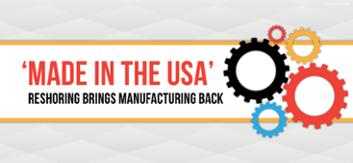More Must Be Done to Overcome the Challenges to Reshoring
August 19, 2015

Despite reports that reshoring efforts are bringing manufacturing back to the US, the manufacturing sector is still seeing a net deficit of jobs since the recession. And more must be done to facilitate the reshoring of jobs from places like Mexico and China, according to a blog post on the website of The Rodon Group, a US injection molder.

In a guest post on the Rodon blog, Adam Robinson, marketing manager at transportation management solutions provider Cerasis, pointed out that about 80,000 manufacturing jobs have come back to the US in the past three years — 60 percent of these from China. However, manufacturing has lost more jobs than gained since the recession seven years ago, and there are a million less manufacturing jobs now than in 2008, he said. And job gains now are more attributed to demand than to reshoring, he added.
Robinson said there has been a decrease in offshoring, but that’s not due to reshoring either. “It’s partly due to the US dollar decline and to the wage spiral during the recession...Also, the majority of factories that could leave may have already gone.”
But there is hope yet for reshoring. A recent survey of the plastics industry by software, consulting, and services provider Nexant found that 70 percent polled had either reshored or were planning to reshore in the near future, Robinson said.
MORE FROM DESIGN NEWS: Rodon: How Part Design and Injection Molding Meld Into a High-Quality Part
Reshoring is a tricky but not impossible business, and companies must use care — especially with authorities in the offshore country — when moving the business back to the US, he said.
“Transitioning from offshore operation is challenging — ending contracts, absorbing exit taxes, obtaining permission to leave, removing your equipment from a foreign facility that now views it as their property,” Robinson said. “International logistics experts and attorneys can facilitate to avoid extreme delays and surprise costs. Noncompliance with any of a country's exit rules might prohibit a company from future operation there. Failure to resolve all exit issues can seize up reshoring efforts.”
Other reshoring challenges include the need for extensive automation to cut production cost — which requires investment in machinery and a redesign in production lines or facilities — and the costs of conforming to US safety requirements, which some manufacturers still resist, Robinson said.
Moreover, the lack of skilled labor in the US is very real problem and needs to continue to be addressed, he said. “For example, Apple cannot launch iPhone production in the US due to the unavailability of 30,000 engineers needed for the manufacturing facilities,” Robinson said.
MORE FROM DESIGN NEWS: Reshoring Nets 10,000 New Jobs in 2014
There are a number of programs manufacturers can join through The Reshoring Initiative to do their part in bolstering the reshoring effort. The Reshoring Initiative provides tools and information to help manufacturers make sourcing decisions, as well as programs to help economic development organizations, manufacturing extension partnerships, universities, community colleges, and other organizations bring back offshored work.
Two of those programs are the Economic Development Program and the Skilled Workforce Development program, Robinson said. The first is high impact with minimal cost, combining resources from the Reshoring Initiative and Datamyne, a provider of US import data, to identify reshoring opportunities, he said.
Meanwhile, the Skilled Workforce Development Program is designed to help communities motivate a higher quantity and quality of manufacturing skilled workers by raising awareness of the benefits of manufacturing careers today. More about these programs can be found on The Reshoring Initiative’s website.

We’re heading to Philly! Design & Manufacturing Philadelphia will take place Oct. 7-8. Get up close with the latest design and manufacturing technologies, meet qualified suppliers for your applications, and expand your network. Learn from experts at educational conferences and specialty events. Register today and join us at Philadelphia’s premier industry showcase!
Elizabeth Montalbano is a freelance writer who has written about technology and culture for more than 15 years. She has lived and worked as a professional journalist in Phoenix, San Francisco and New York City. In her free time she enjoys surfing, traveling, music, yoga and cooking. She currently resides in a village on the southwest coast of Portugal.
About the Author(s)
You May Also Like

.jpg?width=300&auto=webp&quality=80&disable=upscale)

